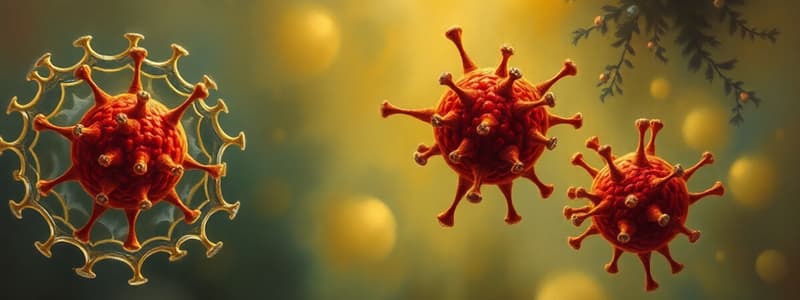Podcast
Questions and Answers
What percentage of peripheral blood lymphocytes do natural killer cells (NK cells) typically comprise?
What percentage of peripheral blood lymphocytes do natural killer cells (NK cells) typically comprise?
- 15-20%
- 20-25%
- 5-10%
- 10-15% (correct)
Which of the following statements correctly describes the recognition capabilities of natural killer cells?
Which of the following statements correctly describes the recognition capabilities of natural killer cells?
- NK cells only recognize viral antigens.
- NK cells require pre-sensitization to target cells.
- NK cells utilize a broad recognition mechanism for ill-defined molecules. (correct)
- NK cells recognize self-class I MHC complexes.
Which markers are primarily used to identify natural killer cells?
Which markers are primarily used to identify natural killer cells?
- CD16 and CD56 (correct)
- CD3 and CD19
- CD4 and CD8
- CiR and CD28
What role does CD8+ T cell play in the recognition of antigens?
What role does CD8+ T cell play in the recognition of antigens?
Which categories do the MHC gene products fall into?
Which categories do the MHC gene products fall into?
How do class II MHC molecules present antigens?
How do class II MHC molecules present antigens?
Which components are encoded by class III MHC genes?
Which components are encoded by class III MHC genes?
Which of the following cells are CD4+ T cells primarily associated with?
Which of the following cells are CD4+ T cells primarily associated with?
What is the primary function of CD8+ T cells?
What is the primary function of CD8+ T cells?
What is necessary for the complete activation of T cells during antigen recognition?
What is necessary for the complete activation of T cells during antigen recognition?
Which immunoglobulin is primarily found on the surface of all B cells as an antigen receptor?
Which immunoglobulin is primarily found on the surface of all B cells as an antigen receptor?
What role do macrophages have in the immune response?
What role do macrophages have in the immune response?
What characterizes dendritic cells in the immune system?
What characterizes dendritic cells in the immune system?
What is the consequence of T cells not receiving the second signal required for activation?
What is the consequence of T cells not receiving the second signal required for activation?
What is the role of CD21 on B cells?
What is the role of CD21 on B cells?
Which immunoglobulin classes make up approximately 95% of plasma immunoglobulins secreted by plasma cells?
Which immunoglobulin classes make up approximately 95% of plasma immunoglobulins secreted by plasma cells?
What is the primary function of innate immunity?
What is the primary function of innate immunity?
Which of the following describes the composition of a T cell receptor (TCR)?
Which of the following describes the composition of a T cell receptor (TCR)?
Which type of immunity is primarily responsible for defense against extracellular microbes?
Which type of immunity is primarily responsible for defense against extracellular microbes?
What is the CD4:CD8 ratio indicative of in T-lymphocytes?
What is the CD4:CD8 ratio indicative of in T-lymphocytes?
Which cytokines are produced specifically by T-helper-1 (TH1) cells?
Which cytokines are produced specifically by T-helper-1 (TH1) cells?
How are the different subsets of T-lymphocytes (CD4 and CD8) characterized?
How are the different subsets of T-lymphocytes (CD4 and CD8) characterized?
What role do natural killer (NK) cells play in the immune system?
What role do natural killer (NK) cells play in the immune system?
What is a primary characteristic of somatic rearrangement of TCR genes?
What is a primary characteristic of somatic rearrangement of TCR genes?
What characterizes the immediate phase of a Type I hypersensitivity reaction?
What characterizes the immediate phase of a Type I hypersensitivity reaction?
Which mechanism is NOT involved in Type II hypersensitivity reactions?
Which mechanism is NOT involved in Type II hypersensitivity reactions?
What is a common outcome of Type III hypersensitivity reactions?
What is a common outcome of Type III hypersensitivity reactions?
In Type IV hypersensitivity, which cells are primarily activated in the delayed type response?
In Type IV hypersensitivity, which cells are primarily activated in the delayed type response?
Which of the following is an example of a Type II hypersensitivity reaction?
Which of the following is an example of a Type II hypersensitivity reaction?
Which diseases are primarily associated with Type III hypersensitivity reactions?
Which diseases are primarily associated with Type III hypersensitivity reactions?
Which role do CD8+ T cells play in Type IV hypersensitivity?
Which role do CD8+ T cells play in Type IV hypersensitivity?
Which statement is true regarding the late phase of Type I hypersensitivity reactions?
Which statement is true regarding the late phase of Type I hypersensitivity reactions?
Flashcards are hidden until you start studying
Study Notes
Immune Response Types
- Innate Immunity: Always present, acts immediately
- Barriers: Skin, mucous membranes
- Cells: Phagocytes (neutrophils, macrophages), NK cells
- Proteins: Complement system
- Adaptive Immunity: Develops after exposure to specific pathogens
- Cell-Mediated Immunity: T cells (thymus-derived) target intracellular pathogens
- Humoral Immunity: B cells (bone marrow-derived) produce antibodies to fight extracellular pathogens
Cells of the Immune System
- T-Lymphocytes (T cells): 60-70% of circulating lymphocytes
- TCR (T cell receptor): Recognizes specific antigens
- CD4 and CD8: Coreceptors that aid in antigen recognition
- CD4: Recognizes Class II MHC molecules on antigen presenting cells
- CD8: Recognizes Class I MHC molecules on infected cells
- T helper cells (TH):
- TH1: Produce cytokines for cell-mediated immunity (e.g., IFN-γ)
- TH2: Produce cytokines for antibody production (e.g., IL-4, IL-5)
- B-Lymphocytes (B cells): 10-20% of circulating lymphocytes
- BCR (B cell receptor): Recognizes specific antigens leads to the production of antibodies (IgM, IgG, IgA, IgE, IgD)
- Macrophages: Phagocytic cells that play a role in both innate and adaptive immunity
- Antigen presentation to T cells via MHC II
- Secrete cytokines
- Destroy tumor cells
- Dendritic Cells and Langerhans' Cells: Antigen presenting cells found in tissues (lymphoid tissue, skin)
- Efficient antigen presentation with poor phagocytic activity
- Natural Killer (NK) Cells: Part of the innate immune system
- Kill infected or cancerous cells without prior sensitization.
- Express CD16 and CD56
- Release Interferon-gamma (IFN-γ)
Main Histocompatibility Complex (MHC)
- MHC I: Expressed on all nucleated cells
- Presents internalized antigens to CD8+ cytotoxic T cells
- MHC II: Expressed on antigen presenting cells (APCs)
- Presents exogenous antigens to CD4+ helper T cells
Hypersensitivity Reactions
- Type I (Immediate): Allergic reactions, rapid response
- Release of histamine and other vasoactive amines from mast cells
- Type II (Cytotoxic): Antibodies directed at antigens on cell surfaces
- Opsonization and phagocytosis
- Antibody-dependent cellular cytotoxicity (ADCC)
- Antibody-mediated cellular dysfunction
- Type III (Immune Complex): Immune complexes deposit in tissues
- Inflammatory response
- Type IV (Delayed): Initiated by T cells
- Delayed-type hypersensitivity (DTH)
- Cell-mediated cytotoxicity
Studying That Suits You
Use AI to generate personalized quizzes and flashcards to suit your learning preferences.



